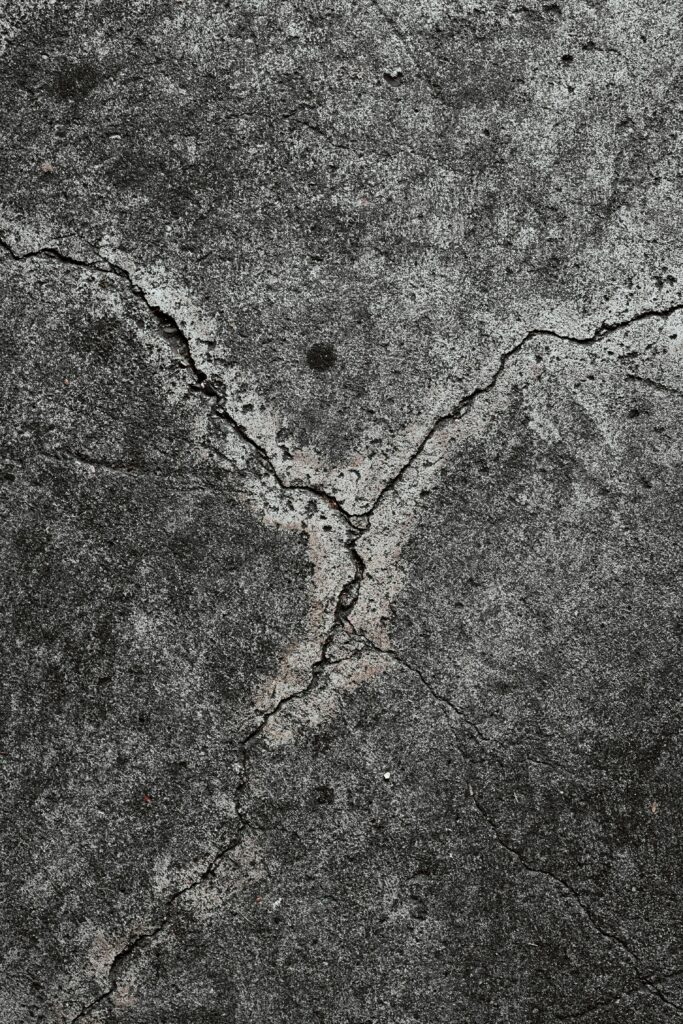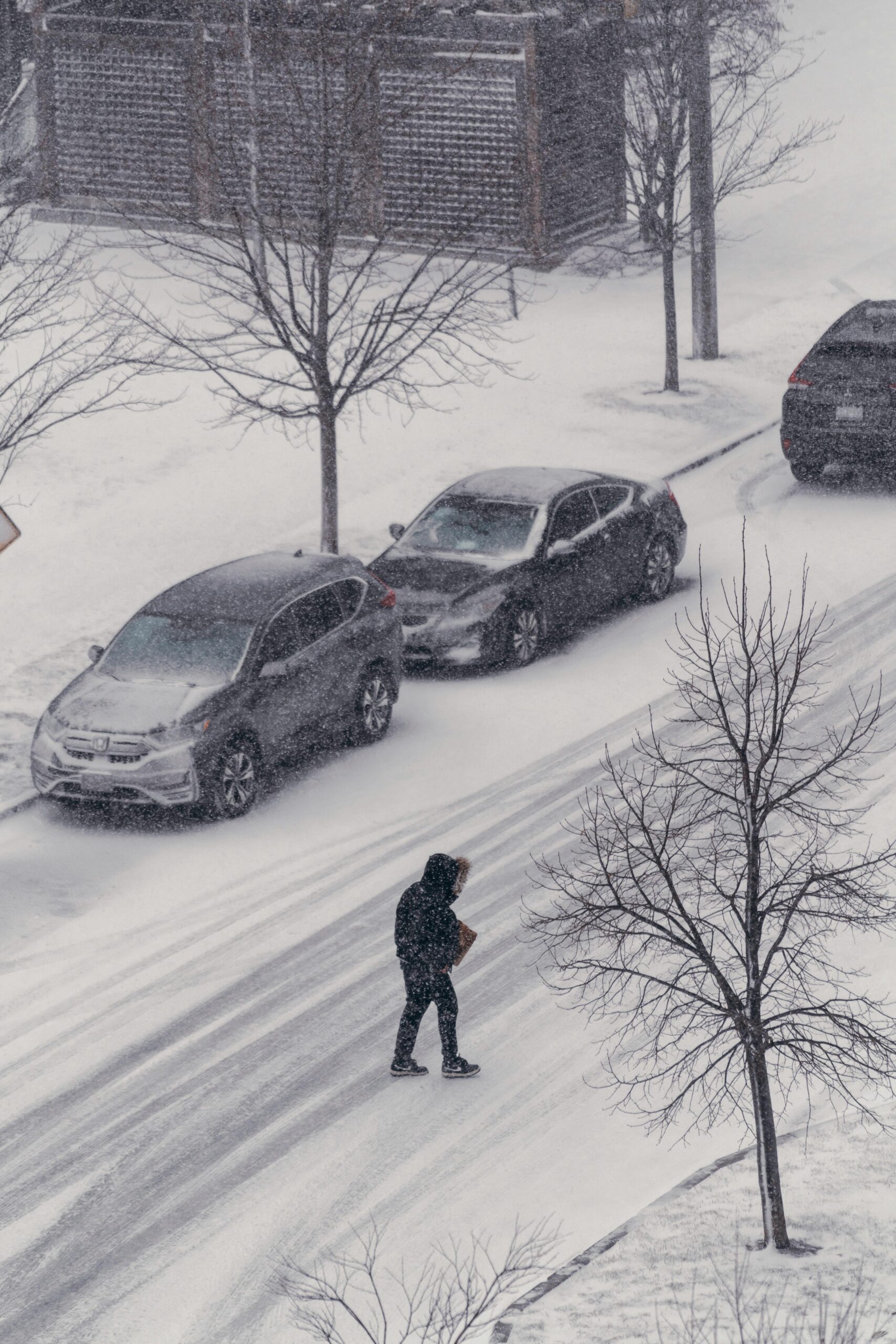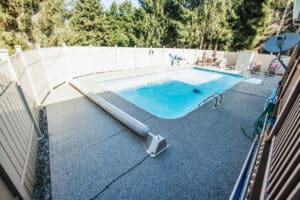Here’s your fear: your car pulls into the garage after a snowy drive, a mix of road salt, slush, and melting snow dripping onto the garage floor. That glossy puddle looks harmless, but you know that salty water begins to soak into the surface, breaking down the concrete from within.
Frankly, salt is one of the worst things for bare concrete. Salt reacts with moisture to open up tiny pores and micro‑cracks in concrete, causing the concrete to flake, pit, and weaken over time as the freeze‑thaw cycle continues.
Everlast Concrete Coatings’ garage floor coatings are built to stop salt damage before it starts, creating a protective coating that prevents deterioration and winter damage while looking awesome. Here’s the science behind salt damage and concrete.
How Road Salt Damages Concrete
De-icing salts like sodium chloride, calcium chloride, and magnesium chloride lower water’s freezing point, but they also trigger serious salt corrosion. As moisture seeps into concrete’s pores, like in your garage, it expands and contracts during the freeze-thaw cycle, causing cracks, scaling, and surface damage. Over time, this salt exposure leads to further damage, ugly salt stains, and even structural deterioration!
That pitting and gravelly degradation of your concrete garage floor? That’s the salt. And here in Upstate New York, it happens faster than we’d all like.

Why Polyaspartic Coatings Are Salt-Resistant
Our polyurea and polyaspartic coatings act as a protective barrier against salt damage, water penetration, and ice melt chemicals.
Let’s clear up one quick thing: when people say “epoxy floor,” they often mean any kind of shiny, protective concrete coating. At Everlast, we don’t use traditional epoxy at all. We use polyurea and polyaspartic coatings, which outperform traditional epoxy in flexibility, durability, and chemical resistance. The terms get used interchangeably online, but the performance difference is huge: poly systems handle harsh winter conditions, deicing salts, and constant moisture far better than any epoxy flooring system.
These coatings form a durable barrier that resists moisture, chemicals, and freeze-thaw cycles, keeping garage floors smooth, attractive, and slip-resistant even in high-traffic areas. Plus, their easy maintenance and long-lasting protection mean no more worrying about costly repairs.
Our coatings use a precise two‑stage process: first, a high‑bond polyurea base coat that seeps into the concrete’s pores to create a tight mechanical grip and stop moisture from sneaking in. Then, we apply a resilient polyaspartic top coat that locks everything down, sealing out salt, snow, and chemicals while adding a glossy, easy‑to‑clean finish. This layered system gives lasting protection that keeps your floor looking sharp even through brutal winters.
Real-World Proof from Winter Customers
We’ve seen hundreds of concrete garage floors across Upstate New York’s harsh winter conditions, and we’re not worried about road salt one bit. Our Everlast coatings stand up to icy roads, snow, and salt residue season after season.
While we encourage customers to rinse their floors occasionally with warm water, we’re fully confident our coatings can handle whatever the winter months throw at them.
How to Protect Your Garage Floor from Road Salt
- Periodically clean with warm water to remove salt residue and debris.
- Maintain ventilation to help moisture evaporate quickly.
- Avoid harsh deicing salts and other chemicals that cause damage to concrete.
- Repair minor cracks early to prevent further deterioration.
- Apply a professional polyaspartic floor coating for lasting and worry-free protection.
Polyurea vs. Epoxy in Winter Conditions
Traditional epoxy floors can handle light salt exposure but are prone to stains, discoloration, and surface damage in low temperatures.
Polyurea and polyaspartic systems, however, offer flexibility and chemical resistance that epoxy can’t match. They bond deeply to the concrete surface and flex with temperature changes, preventing cracks from forming during freeze-thaw cycles.
If you’re searching for the best epoxy garage floor coating for winter, what you really need is a polyaspartic coating type that offers superior protection.
Real Protection for Real Winters – Give Us A Call For a Free Quote!
No garage floor should crumble under the weight of road salt, ice melt, and snow. Everlast’s polyurea and polyaspartic coatings prevent salt damage, protect against freeze-thaw cycles, and make cleanup simple. Don’t wait until you see stains, cracks, or surface damage— protect your concrete surface now and enjoy a floor that lasts for years.
Ready to stop salt in its tracks? Contact Everlast Concrete Coatings today for a free estimate and discover how our professional help keeps your garage floors looking brand new, season after season.
FAQ: Road Salt and Concrete Coatings
Does road salt damage concrete?
Yes. Road salt and concrete floors don’t mix. Salt creates expansion pressure in the concrete’s pores, leading to cracking and scaling. Without a protective coating, this damage worsens every winter.
What kind of salt does not harm concrete?
Calcium magnesium acetate (CMA) is the safest deicing option for concrete. Still, polyaspartic coatings provide the most reliable way to prevent salt damage entirely.
How to remove road salt from concrete garage floor?
Use warm water and a gentle detergent, then rinse thoroughly. Regular cleaning helps prevent salt stains and further deterioration.
What is the best ice melt that won’t destroy concrete?
Look for concrete-safe ice melt containing magnesium chloride or CMA. Avoid using sodium chloride, which can cause significant damage over time.
How to protect garage floor from road salt?
Install a polyurea or polyaspartic coating. It blocks moisture, prevents salt exposure, and offers long-lasting protection even in low temperatures.
Does road salt damage epoxy floors?
Yes, repeated salt exposure can cause epoxy coatings to peel or discolor. Everlast’s polyaspartic coating resists chemicals and salt corrosion, making it a better choice.
Can salt damaged concrete be repaired?
Yes. After cleaning and removing surface damage, Everlast can apply a protective barrier coating to restore durability and prevent further damage.
What does salt damage look like on concrete?
You’ll notice white salt stains, pitting, or crumbling along the surface. Severe winter damage may cause chunks to flake off.
What concrete sealer protects against salt?
A professional polyaspartic or polyurea coating from Everlast Concrete Coatings is the best defense against salt damage concrete and harsh winter conditions.
Where does Everlast Concrete Coatings serve?
We do concrete coatings in Syracuse, the Finger Lakes, Corning, Canandaigua, Geneva, and more.





